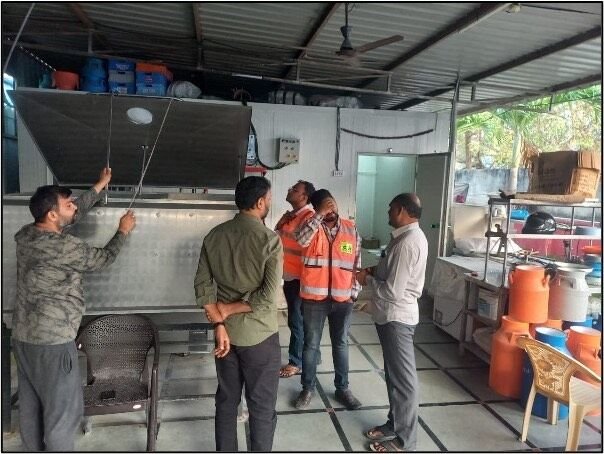Hyderabad: Task Force teams conducted a special drive at loose milk collection and distribution centers in the eastern part of Hyderabad during the early hours of February 11.
This follows growing concerns about milk adulteration in a neighboring state,
Two teams carried out inspections at Karmanghat, Linnojiguda, LB Nagar, and Hayathnagar. Food Safety on Wheels (FSW) vehicles, equipped with milk-o-screen devices and lab technicians, were deployed for on-the-spot testing of loose milk samples.
The following facilities were inspected:
1. Sri Sai Dairy Products, Almasguda (V), Balapur (M)
2. Sri Laxmi Narsimha Milk Traders, Karmanghat
3. Sri Sai Milk Products, Tapovan Colony, Linnojiguda
4. Sri Geetha Milk Traders & Processing Unit, Nadergul (V)
5. Sapthagiri Foods, Karmanghat
6. Suguna Dairy, Karmanghat
7. Srinivasa Dairy, B.N. Reddy Nagar, Hayathnagar
8. Alsafa Dairy, Auto Nagar, Hayathnagar
9. Dharani Dairy, Vanasthalipuram, Hayathnagar
No Prohibited Additives Found, but Hygiene Lapses Noted
Following the milk sample tests, officials confirmed that no prohibited additives such as maltodextrin, urea, or peroxide were detected. However, documentary and sanitary lapses were identified at some premises, leading to the issuance of notices under the Food Safety and Standards Act (FSS Act), 2006.
Additionally, samples of other dairy products such as ghee and curd were collected and sent to the laboratory for further analysis.
Understanding Maltodextrin and Its Health Risks
Maltodextrin, a polysaccharide derived from starch sources like corn, rice, or potatoes, is legally permitted in certain processed foods but is strictly prohibited in milk.
As per Food Safety and Standards Regulations (FSSR) 2.1.2 (3):
• Maltodextrin is commonly used in processed foods, sports drinks, infant formulas, and dietary supplements under-regulated limits.
• In milk, maltodextrin is not allowed as it can artificially increase total solids content, altering its natural composition and misleading consumers.
• Its high glycemic index poses health risks for individuals with diabetes and metabolic disorders when added to milk without regulation.
Officials emphasized that adding maltodextrin to milk is a form of adulteration that compromises milk purity and creates a false perception of richness by increasing viscosity and carbohydrate levels while potentially reducing essential nutrients like proteins and fats.
Awareness Among Dairy Operators
The food business operators at the inspected premises were sensitized about the risks of maltodextrin and other additives. They were directed to implement testing measures at the collection level to maintain milk quality.
Officials have urged consumers to remain vigilant and report any suspicious quality concerns related to milk products.







